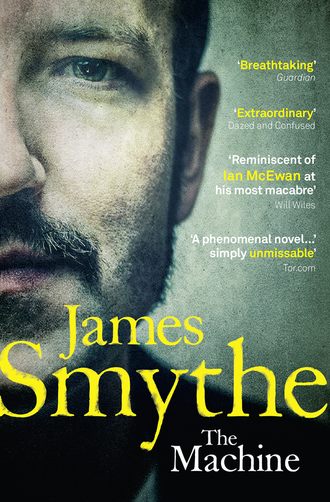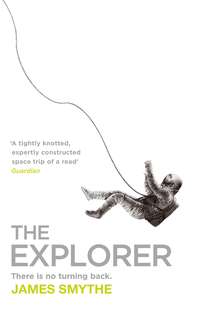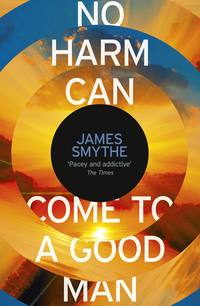
Полная версия
The Machine
The screen gets lighter, and she sees the button labelled ABOUT. She presses it, and there, a year and a firmware number. She reasons that this must have been one of the first commercial models, before even her mother started on the programme, and well before Vic was using one. She pulls the Crown down from the dock and the screen changes, updates. PURGE, it invokes, or REPLENISH. Like this is some sort of advertisement. She’s seen the language on both beauty products and bleaches. She doesn’t put the Crown on her head, because she dare not.
She’s thought about it, sometimes: as she’s tried to get to sleep, lying in bed, thinking about how easy it would be to wear a Crown, to press the buttons and to talk about Vic and herself, and their old life together. To talk her way through everything that she’s lost. To press the PURGE button and feel it all drift away. Vic used to say that it felt like when you take painkillers for a wound. He said that they gave him heavy stuff after the IED went off and put its shrapnel in his shoulder and his neck, and once he’d popped them there was a sense that it had once hurt, but that it was like an echo of the pain was all that was left, or the memory of the pain. Like it’s been rubbed hard and then left alone. That’s what the Machine did. He rarely spoke about it as time went on, but in the early days, before Beth was allowed anywhere near the process, when Vic still knew what he was doing and why he was doing it, he frequently used to describe it to Beth when he got home. They said it would be two weeks before he’d start to lose what it was he was running from, and it was, almost to the day. After that, Beth didn’t like to say anything more. He knew that it was time for his treatments and he didn’t question them. Beth looks at the bar for copying Vic’s files over, and it’s hardly gone down.
Come on, she says, though it’s not like she can do anything with it here and now. She lies on the bed next to the Machine, a bed that she’s never actually slept in because it felt wrong, somehow, ever since she decorated the room. She watches the bar and shuts her eyes, and thinks about Vic and what he could be.
When the company behind the Machine announced that they were working on a cure – they would put the word in inverted commas, because they were so cautious with how they went about presenting it to the world after the last time – they said that the technology side of things was flawless.
They said, We can take a person and make them whole again.
Beth – everybody – doubted it, but then they showed videos of a man and his progress. In the earliest videos he shuffled like a zombie and needed feeding and changing and his eyes lolled back in his head even as his loved ones poked and prodded him, asking him questions, trying to get a response. In later ones he fed himself and walked, and even responded to his name. They showed old video of him ignoring persistent, insistent calls – Shaun, Shaun! – over and over again. Then they invited him up onto the stage where they were making the announcement: and they did it solely by calling his name. Once. Shaun! He ran up, and he shook their hands. He looked at the cameras, and his gaze was a bit glassy-eyed but he was mostly there. He waved at the crowd, and then they asked his wife up there as well, and they embraced on stage to applause. Standing ovation: he is healed.
And this can only get better, the men from the company promised. Beth saw it in their eyes: the idea that this was somehow their redemption. The thing that might stop their houses being burned and people fighting with them in the streets and the headlines on the tabloid sites. They have destroyed thousands of lives and now they’re back, ready to save the day. They said, It takes years of therapy to bring them to this point. It uses our pioneering technologies. The process works best when we’ve got a full and frank medical history, and when you help us.
Shaun was back in another video. This time, his bedside in some hospice somewhere, where the bed was thin and metal-framed and the bed sheets that yellow colour. On his head was a Crown, or what passes for a Crown now: tiny multi-coloured pads designed by a famous South American designer, to make it appealing, placed on the temples and the forehead, tiny lights indicating that they’re all wirelessly connected. His wife talked Shaun through a shared experience from their past that, presumably, had been lost; she’s laughing and squeezing his hands.
We found it so funny, she said, and then you opened the presents, and you had another one, from Mark and the kids. A funny story, and when she laughed at the end, so too did Shaun, somehow simpatico to it all. On stage, Shaun watched the video and then spoke to the audience. Slow and measured, careful with his words.
I can hardly believe this is me, he said. Standing here in front of you. The audience whooped and clamoured.
Shaun represents hundreds of man-hours of work, the doctors said, and it’s not perfect. Shaun’s not perfect. But we’ll get there. By the end of this decade, they said, we hope to be able to offer this therapy to many of our ex-patients. Shaun waved again. The end of the decade made Beth’s heart sink, because that was eight years away. That was so far away that, by the time it arrived, she would have been apart from Vic for more time than they had been together. And that was two years ago. They were asked, over and over, how long it would be before the public could have access to the tech. We don’t want to rush things, they said. They – everybody – wanted to avoid a situation like the first time around: rushed to market, and then thousands damaged, seemingly irreparably. They were cautious, and their ‘end of the decade’ became the start of the next decade, in the post-Shaun interviews. They wanted to wait until it was right.
The internet didn’t want to wait, though. People who knew things, people who worked for the company and hated what they had done, people with vested interests: they all stepped forward under the internet’s veil of anonymity, and they told others how to do it. They leaked firmware, software, instructions; things that somehow they had got their hands on, that they shouldn’t have had. Cloak and dagger, they explained that the Machine could be used to create a new persona in the damaged. It could build them up again, as they were, based on who they were. It could be achieved through talk, through photographs and videos. It was better if you had the recordings of their original sessions. They got together in clandestine meetings, organized themselves to do work for this: on the technology, the software, the work itself. Eventually they had their own case study, their own version of Shaun: a lady called Marcela. She was from Eastern Europe, and Beth didn’t understand what she was saying but she got the gist. Marcela was herself again, in that she smiled and she waved at the camera and the person behind it, and they bent past the lens and leaned in to kiss her and she kissed his bearded face back, and he gave a thumbs-up to the camera.
We used the original recordings to help Marcela, the video said, and that sold it to Beth. Because she couldn’t wait. This was too important to her, and to Vic. When Beth opens her eyes, the on-screen bar is finished: only it says that the files have been moved, not copied. She looks at the hard drive and it’s empty, but it doesn’t matter. Vic’s memories are in the Machine now, and where they should be.
4
The window of her bedroom opens onto a view of what used to be thought of as a field, but now it’s just scruff, cracked dry soil and scuffed-up anthills. They called them the Grasslands when they built this place. The area between the flats and the cliffs isn’t huge, because that was the only way that they could get planning permission, and the most-desired flats had been the ones with the eastern-aspect view: looking out onto all that grass. The residents would remark that they lived in the greyest building on the island, but it didn’t matter, because the view was what you saw every morning. You weren’t looking at the walls. It was meant to be for new overspill from Portsmouth, because the mainland couldn’t expand any more. That was the trick with it being so enclosed: there was no more land to build on. The developers moved across the water, assuming that people would want to live there, but they didn’t. Apart from Beth, that is. The Grasslands themselves were protected because they were so close to the new cliffs, far too fragile to build on. The local council had decided that those flats that had the spectacular views – out to the sea, to the mainland across the way, to freedom – would be put up for sale, and the rest could go to whoever needed them. Back then, when the first proposals for the construction of the site went through, the Grasslands were still green, and the trees dotted around the landscape were all green as well, their leaves almost constantly present. When Beth moved in she didn’t know the names of them, but it helped her, being able to see them so unfaltering: when she was at her lowest, they survived. The trees are still there, now bare or getting there, but the grass is almost entirely gone: it’s now a sickly yellowing orange, almost burnt. It looks the way that lawns used to look in the summertime after kids had played on them: hard, dry soil patches, like liver-spotted scalp peering through thinning hair.
Beth spends the day waiting for the files to copy, staring out of her window at the Grasslands, and by the time she’s remembered that she hasn’t eaten it’s dark outside. She looks at the tins piled in the kitchen and thinks about how many of them she’ll be eating in the weeks – months? – to come, baked beans and spaghetti hoops on toast, and she looks out of her living room window – past the rest of the estate, over towards the street of shops and takeaway restaurants that leads towards the main road – and decides to chance it. She opens the front door and looks around for people, but she can’t see anybody out this side. There’s noise (rustling and cackling) from behind the block, from the Grasslands, but that doesn’t worry her. The only creatures that she ever sees out on the Grasslands are cats, from all around the neighbourhood: a glaring of them masses, like a congregation. They’re not watching her or the flat or anything in particular. They just seem to mass. If there are kids out there – or worse – she can never see them. They’ve become excellent at staying in the dark. She locks the door behind her, and then checks it’s locked, shoving it with her shoulder. When it doesn’t budge she checks the window where the men took it out, pushing it as hard as she can to check it’s secure. Satisfied, she walks down the bridge path, towards the stairwell. The doorway’s open – some of the residents collectively decided to take the door off, because there were times that trouble had waited at the bottom of the stairs, and they wanted to make sure that they could hear it in future – and the lights are on, which buoys Beth. She runs down them, really pelts, and then out into the estate, past the bollards, to the street. She wants something hot. A curry, maybe, or spicy Chinese. She can smell the Indian Palace from the edge of the estate: the restaurant opens their back windows and doors, trying to entice people down. Some nights the whole estate can reek of food, and some nights that’s the last thing that Beth wants to think about. But tonight it’s enough.
Inside the restaurant they’re playing music that Beth recognizes, but in some water-chime musical form. Songs from when she was a child, that she still knows the words to: huge ballads, slow-dance pop songs that once soundtracked hit movies. The waiters all sit around a table at the back, all with half-pint glasses half-filled with lager. Two of the four stand up when Beth walks in.
All right love, one of them asks.
Hi, Beth says. I wanted a takeaway?
Sure, sure. What can I get you?
Chicken korma and a pilau rice, she says. The man nods. He leans back and peers through the door to the kitchen, then nods at the solitary chef Beth can see in there, who’s been leaning against the cookers.
It’ll be a few minutes, the waiter says to Beth. Want a drink?
I’m fine, she says.
She sits at a table by herself to wait, near the window, and she watches the few other people out for the evening, all of them going to get takeaways or hurrying forward by themselves, collars up and eyes down. A group of kids – heads shaven into a step around the back and sides, suddenly popular again, and ripped jeans with smart-looking cheap shirts – walk past: they see her peering out and they spit at the window. One of them undoes his fly and rushes up to her, and she flinches backwards, away from the window. One of them stands at the back and doesn’t do anything but stare, a fixed gaze that won’t break. They all laugh.
Ignore them, the waiter who took her order says.
Bunch of pricks, one of the others says. He doesn’t look up from his beer.
I know, Beth says. The waiter walks towards her table and leans over it. There are curtains that she hadn’t seen, only half-height ones, but he pulls them across, blocking her view of the street, and the kids’ view in.
Better when they can’t see the customers, he says. Beth sits and stares at the curtain for the next few minutes, because she can hear them still out there on the street. They’re laughing about something, down at the kebab house, and there are occasional bangs where they’re throwing something, or hitting something. She thinks about standing up to see what they’re doing, but knows that if they see her it will only antagonize them. She nearly asks the waiters how many times their front glass has been broken. It always looks new, she thinks.
When the waiter comes back with her food (which smells amazing, she thinks, cooked freshly because she’s the only customer they’ve had all evening) he loads it into a plastic bag and throws a few poppadoms in.
You going to be all right? he asks.
Yes, she says. I only live up the hill.
In the estate? He inhales and laughs with the other waiters. I’ll walk you.
Don’t be silly, Beth says.
What else am I doing?
I’m fine.
Look at all my customers, he says. He opens the door for her and stands back, letting her head onto the street first. The boys outside the kebab shop shut up slowly, one by one, falling into line. They’re all some ambiguous age that Beth can’t tell, past the hoods and caps, even in this heat. They’re looking over at them. Just ignore them, the waiter says. He walks next to Beth, briskly, their pace faster even than when she walked down here, and they don’t look behind them. The boys stay quiet, so they don’t know if they’re being followed. Beth pictures it: them dropping their kebabs and cans, leaving them on the side, and then walking behind them as one. Falling into a pack, a tight unit, rapidly advancing, a cloud of dust ready to swallow them whole. That one who stared suddenly at the front, leading the others.
They make it to the lights of the estate, and the bollards. Beth can see her flat from here. At a dash, it’s only thirty seconds away. The waiter stops. You all right from here? He looks back where they’ve come from. The boys are nowhere to be seen.
I’m fine. Thank you so much.
Pleasure. Want to walk me back to the restaurant now? He grins. Joking, joking, he says. Enjoy your dinner.
He heads back down the path towards the road. There’s a bit where there are no lights and he disappears, and Beth waits to see him reappear on the other side of it. When he does she goes into the stairwell, and then along to her flat. She fumbles for her keys, but there’s nobody anywhere near her, and no noise she can hear apart from the background murmur of neighbours’ televisions, and the occasional rustle of a cat. She locks the door behind her, then goes to the kitchen with the bag and unpacks it on the worktop. She peels the lids from the tubs, takes a plate and turns them both out onto it, then sits on the sofa with the plate on her knees, the greasy paper slip of poppadoms on the table. She puts the TV on and tries to concentrate on it. She flicks through channels with one hand, eating with the other. But there’s something else. She can hear it: a buzzing. She mutes the TV, cutting the weather report off midsentence – the symbols all sweating comical suns, not much chance of them saying anything to contradict that – and listens for it. It’s like a fridge, but hers is silent, or an old light bulb about to blow, but hers are all energy-saving modern ones. She puts the plate on the table in front of her and walks around the living room, looking for the source. She can’t find it in here, so she tries the spare bedroom and then remembers about the Machine. The screen is on – still – and the buzz coming from it. Not the screen: just, vaguely, the Machine itself. She can’t pinpoint it, but she’s sure of the source. She puts a hand on the casement and there’s something, a movement. The most subtle vibration.
I should switch you off, she says to it. She leans down to the plug and flicks the switch and the Machine’s screen goes dark. She can still hear the buzz, though, as she goes to leave the room: and as she lies in her bed, staring at the ceiling, thinking about how this is all going to go. And still, even with it this close to actually happening, how she has her doubts.
5
She swims first thing in the morning. Only some mornings – not enough to call it a regime, but more than a habit. Some deep-seated feeling about being so close to – inside, even, beneath and through – something that caused so much destruction and yet is somehow blameless. She gets up before anybody else, when it’s still barely light, and she peels her clothes off and swims out against the waves into the water, and then back: and she stands on the beach and waits for the sun to dry her, which only takes minutes, and then she dresses herself. She doesn’t get her hair wet – she ties it up above her head, a style that she never used to wear, but that’s practical for her, here and now – and she puts her work clothes straight on and then sets off.
Her walk to work takes her along the path that runs adjacent to the coastline. She and Vic had always wanted to live by the sea: they had said that when he retired it was what they would do. (Without him here, she sometimes thinks, this feels almost like cheating on him, with this place instead of another man. She is sure that he would – will – forgive her.) The path is hard ground, old mud that’s faded and cracked underfoot. It falls just shy of the green grass; as she walks she keeps her eyes on that side. On the other side are the roughest blocks, the ones where the people always seem crammed in. These were the last ones built, designed to take the council housing overspill from Old Portsmouth after the flooding. The people there are bitter that they ended up here. They didn’t choose to move: it was their only option, if they wanted to live where they could still keep their jobs. Most of the children from the estate go to her school, and she teaches many of them, or tries to. The worst of her kids invariably come from the worst parts of the island, where their parents have sob stories about how they lost their jobs on the mainland, or their homes. There’s a joke around Portsmouth and Southampton, where they call the island Alcatraz and refer to the ferry that runs six times a day as the prison boat. They don’t try and hide it. Anybody with real money left the island a long time ago. Before this, Beth would have been one of those people: running before they sank along with the rest.
Beth passes some children who clearly have no intention of going to school today (out at this time already, racing around on their bikes, standing bolt upright on the pedals and clipping their wheels on curbs, trying to make the bikes jump off the ground for even a few inches of air), and thinks about persuading their parents to persuade them to go, or to force them. It’s not a cost thing, she knows, because they fought to keep all the schools free when the new Prime Minister took over: it’s an effort thing. They circle her as she walks, flitting between the road and the grass verge. Most mornings they ignore her. Today, one of them rides alongside her as his friends drop back, watching from a distance. She thinks she recognizes him; one of the youths from outside the takeaway house, maybe. Or just from the estate. They all blur into one after a while. Beth pulls her bag closer to her body. She remembers being in London when she was much younger, walking down roads where footsteps behind her might have meant an imminent mugging: she remembers how much that feeling holds you back, steps on your toes as it walks alongside you. She breathes and tries to stare past him, even as he nudges towards her, slightly ahead of her. His hair is clipped short on top, longer at the back and sides – looks like a home-job, clippers rather than scissors – and he is slightly boss-eyed, she notices, as he turns his head back towards her, peers at her from under his drooping eyelids. She wonders if he’s stoned. He’s very young to be getting stoned.
The fuck you looking at? he asks. His friends laugh behind them: she can hear the spokes of their cheap bikes clattering against wheel frames. You looking at me?
She doesn’t answer him. Instead, she stares past him – at the boat in the distance, moored up, ready to take people across the water – and carries on walking. He darts in front of her, swaying across her path, forcing her to keep pausing her steps. He’s only twelve or thirteen, she thinks, but his voice has broken into a full baritone, making him de facto ringleader.
I asked you a fucking question, he says, but Beth still ignores him. She would have taken him to task, in the old days: the Beth who walked along those streets in London and heard footsteps would have turned, stopped, done something surprising to scare them off. They’re all mouth and no trousers, she would tell herself. But here she keeps her head down, because this is how she knows it has to work. No trouble. Every day is exactly the same where this is concerned. Beth carries on walking, heading up some steps and away from the front, even though it’s slightly off-route for her, because she knows that they won’t follow. They stay at the bottom of the steps and stand on the pedals of their bikes, laughing as if they’ve won.
Over the hill she sees the school: the gate that needs a fob to get into the playground, and then the door that requires a swipe of her ID card to get inside the building; and the metal detectors, which used to be something that they threw at troubled schools in America and people the world over laughed at as something that they would never need themselves, because our kids just weren’t like that. Now, there’s two of the turnstiles and a room, to the left of where the security guard stands, which has handcuffs inside and a locked cupboard crammed with mace, tasers, truncheons and a bullet-proof vest, just in case. Because, the Head told them when the decree came to have them installed, you never know.
The classrooms of Beth’s school – which swallowed the other two nearest schools on this part of the island, a primary and a secondary, turning them into one giant institution spanning two campuses – don’t have any air conditioning. The school priced them up, worked out how much it would cost, but it was unfeasible. Even the discounted companies priced themselves out of the running, mainly because the school had one of the lowest budgets of any in the county. Instead, they made do with opened windows and cheap desk fans, often two or three in each classroom, blasting off from one wall, pushing the air away from the desks and ushering it towards the outside.
Beth’s Year Ten form has forty-one students: twenty-four girls and seventeen boys. The ratio makes the boys excitable. They rock against their chairs and jiggle their legs, their feet tapping furiously on the floors when some of the girls do salacious things: taking off their jumpers, wearing shirts that are paler than the rules allow, fanning their skirts when they stand up. One of the repercussions of the heat is that everything becomes sweat-laden, and the school has rules. Shirts must be of a certain thickness; no thin cotton, nothing that can become too transparent in the heat. The class sit on cheap plastic chairs; every day, no matter who is sitting down, there’s a sweat mark on the seat when they leave. Beth hardly sits down at all any more; she leans against the desk, or she paces.






